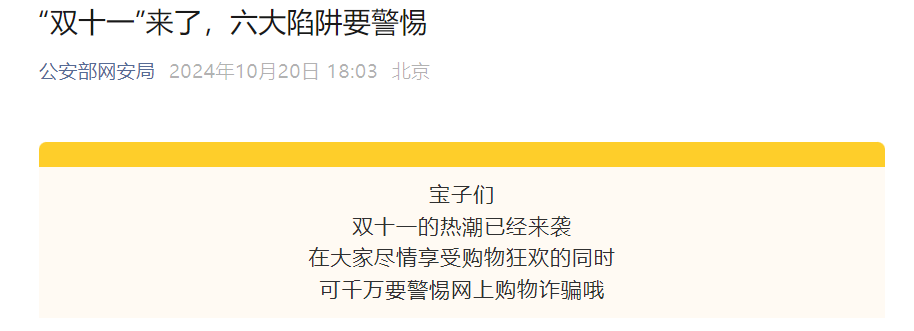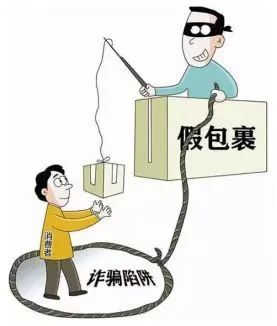
As the Double 11 shopping festival kicks off, while consumers are busy purchasing favorite items, criminals are taking advantage by setting up various online fraud schemes. The Cybersecurity Bureau of the Ministry of Public Security advises the public to stay alert to avoid falling into these scams.

-
Impersonated Customer Service Scams: Scammers may pose as customer service representatives, sending fake messages or emails to request personal information or payments. Consumers should verify the customer service identity through official channels and avoid sharing personal details readily.
-
Fake Shopping Websites: These sites appear legitimate and attract consumers with low prices, but they’re traps set by scammers. Consumers should only shop on well-known e-commerce platforms and avoid direct payments to unknown sites.
-
Pre-sale Scams: Taking advantage of Double 11 pre-sale events, scammers deceive consumers into paying upfront, only to disappear afterward. Consumers should stick to pre-sale activities with platform guarantees and avoid paying strangers directly.
-
Prize-Winning Scams: Scammers may notify consumers by text or email about “winning” a prize, requiring a fee or taxes to claim it. Consumers should remember that legitimate prize draws do not ask for fees upfront.
-
Delivery Scams: Scammers posing as couriers send fake messages, tricking consumers into following a public account to steal their information. When receiving such messages, consumers should contact the delivery company directly for verification.
-
Return Scams: Using returns and refunds as an excuse, scammers trick consumers into providing one-time passcodes, gaining access to personal information or funds. Consumers should initiate returns through official channels and avoid trusting unknown calls or messages.
Analysis of a Delivery Scam Process
Ms. Que from Chengdu encountered a typical online scam. She received a delivery package with a card reading “Claim Three Free Gifts for ¥0.” Tempted, she scanned the QR code on the card and added a supposed “customer service” account. She was then added to a group promoting cash-back schemes for small purchases and ultimately invested over ¥30,000. When she tried to withdraw her principal, the scammers gave various excuses and demanded additional deposits. Only then did she realize it was likely a scam.
These scams typically proceed in stages: they start by luring victims with free gifts or discounts, then lead them to join a cash-back group or download a fraudulent app. They establish trust through small rewards and ultimately refuse withdrawals, urging further investment. This scam tactic is highly concealed, technically sophisticated, and has a broad impact.

To prevent falling victim to such scams, the public should stay vigilant and avoid easily believing information or promises from strangers. Exercise caution with any financial transactions or investment opportunities, and be wary of sharing personal information, such as bank details or ID numbers. Safety tips from telecom operators and public security agencies should be carefully read and remembered.
How Companies Can Prevent Fraudulent Deliveries
Dingxiang's Business Security Intelligence Center suggests that consumers should verify unknown deliveries by checking logistics and courier information on official websites and contacting the courier by phone. For unfamiliar packages, it’s essential to verify the courier's identity and inspect package contents. Additionally, consumers should avoid scanning QR codes or clicking links in unsolicited packages, especially if asked to provide sensitive information like bank or ID numbers.
To help logistics companies identify suspicious packages, Dingxiang recommends integrating its business security intelligence. This allows for screening high-risk numbers and staying informed on the latest fraud tactics to identify packages posted by fraud groups effectively.
Dingxiang’s Business Security Intelligence maintains over 30,000 risk sources, monitoring black-market communities, darknet forums, illegal sites and apps, crowdsourcing platforms, and legitimate data sharing to collect risk data. By profiling risk populations, scoring behavior, analyzing relationships, and detecting fraud networks, this service can provide insights into telecommunications fraud, IP and device risk, and transaction risk across various industries. Using a fraud risk verification module, it cross-references phone numbers in banking, transactions, and transfers to check if they are associated with fraud, scoring their risk levels.
Dingxiang also recommends courier companies use the Xintell Intelligent Modeling Platform to analyze data on senders, recipients, phone numbers, and devices. By leveraging Hadoop, custom components, and drag-and-drop operations, the platform simplifies big data analysis, making it accessible to engineers, data scientists, and business staff alike. Xintell supports anti-fraud efforts by providing model training for fraud detection, risk management, marketing, and customer segmentation, dynamically upgrading models over time.
Furthermore, courier companies should enhance training for couriers to help them recognize suspicious packages and handle unusual situations properly.
Effective prevention starts at the source. By monitoring for risks in shipments from the start, courier companies can significantly reduce losses and better safeguard recipients' financial security.
Consumer E-Commerce Safety Warning
Online shopping festivals can be both exciting for consumers and profitable for fraudsters. Criminal groups often use sophisticated and concealed methods to target consumers on a large scale.
- Verify Information: Always verify the sender’s identity through official channels before providing personal information or making payments.
- Choose Reputable Platforms: Use known e-commerce platforms and avoid shopping on unknown sites.
- Protect Personal Information: Avoid sharing personal details, especially bank account numbers, passwords, and verification codes.
- Be Wary of Suspicious Links: Avoid clicking unknown links to prevent data theft.
- Report Suspicious Activity: Immediately report any suspected fraud to authorities.
The Double 11 shopping festival is a peak period for fraud. Consumers should take precautions to enjoy their shopping safely and protect their personal assets.


